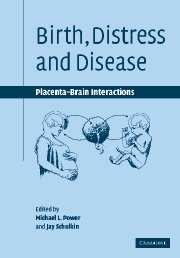Book contents
- Frontmatter
- Contents
- List of contributors
- Preface
- Introduction: brain and placenta, birth and behavior, health and disease
- 1 Placental expression of neurohormones and other neuroactive molecules in human pregnancy
- 2 The regulation of human parturition
- 3 Maternal nutrition and metabolic control of pregnancy
- 4 Fetal HPA activation, preterm birth and postnatal programming
- 5 Prenatal glucocorticoids and the programming of adult disease
- 6 Prenatal stress and stress physiology influences human fetal and infant development
- 7 Glucocorticoids and the ups and downs of neuropeptide gene expression
- 8 Glucocorticoid facilitation of corticotropin-releasing hormone in the placenta and the brain: functional impact on birth and behavior
- Index
8 - Glucocorticoid facilitation of corticotropin-releasing hormone in the placenta and the brain: functional impact on birth and behavior
Published online by Cambridge University Press: 16 October 2009
- Frontmatter
- Contents
- List of contributors
- Preface
- Introduction: brain and placenta, birth and behavior, health and disease
- 1 Placental expression of neurohormones and other neuroactive molecules in human pregnancy
- 2 The regulation of human parturition
- 3 Maternal nutrition and metabolic control of pregnancy
- 4 Fetal HPA activation, preterm birth and postnatal programming
- 5 Prenatal glucocorticoids and the programming of adult disease
- 6 Prenatal stress and stress physiology influences human fetal and infant development
- 7 Glucocorticoids and the ups and downs of neuropeptide gene expression
- 8 Glucocorticoid facilitation of corticotropin-releasing hormone in the placenta and the brain: functional impact on birth and behavior
- Index
Summary
Introduction
Glucocorticoids (e.g. cortisol) and corticotropin-releasing hormone (CRH) are important in fetal development and eventually in parturition. However, chronically elevated glucocorticoids have both short- and long-term consequences. The cortisol/CRH system within the placenta is a positive feedback system (e.g. Robinson et al., 1988; Jones et al., 1989), similar to that of several regions in the brain that regulate the behaviors that underlie fear and anxiety (Makino et al., 1994a, b). One noted endocrine effect is the facilitation of CRH gene expression by cortisol during pregnancy. But exaggerated expression of CRH in the placenta may reflect states of adversity and an increased vulnerability to preterm delivery of the neonate (Majzoub et al., 1999).
Increased peripheral cortisol during pregnancy (and also when not pregnant) can cross the blood—brain barrier and may affect the mother's experience of stressful situations. Pregnancy is inherently a metabolically stressful condition, whether psychological expectancies are optimistic or not. Glucocorticoids, cortisol in particular, have diverse effects in the brain in the long-term regulation of gene products, one of which is CRH (Schulkin, 2003).
Additionally, findings from rat and nonhuman primate studies suggest that prenatal and early life adversity can have lifelong consequences on stress responses and, potentially, on vulnerability to physical and psychiatric disorders (Heim and Nemeroff, 2002).
- Type
- Chapter
- Information
- Birth, Distress and DiseasePlacental-Brain Interactions, pp. 235 - 268Publisher: Cambridge University PressPrint publication year: 2005
- 5
- Cited by



